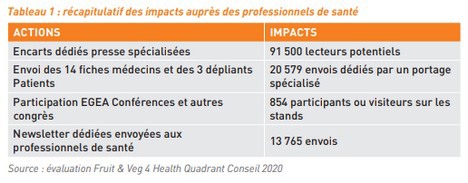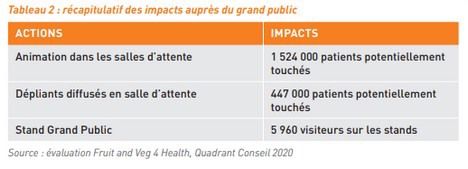A video conference was held to present the findings of the 3-year Fruit & Veg 4 Health program, as well as the planned follow-up to this initiative. Co-funded by the European Union, this information program has aimed to make health professionals the ambassadors of a healthy diet rich in fruits and vegetables.
A program born from several observations
According to Elio Riboli, Professor of Epidemiology and Cancer Prevention at Imperial College London School of Public Health in the UK, the relationship between health and nutrition is not recent, but was first established as 'popular wisdom'. It was only later that science became interested in the issue. In the late 90's, consumption started to be studied in order to determine a possible correlation between eating habits and the onset of certain diseases; a correlation that has clearly been confirmed following these two decades of research. We now know that the consumption of fruits and vegetables reduces the risk of developing cancer (by about 10%), strongly reduces the risk of cardiovascular disease (by 20-30%), as well as the risk of premature death. Consuming a variety of fruits and vegetables, raw or cooked, daily and over the long term has a beneficial impact on your health.
But besides that, it has also been brought to light that the consumption of fruits and vegetables in France, especially among people under 35, is starting to fall and that today, only 43% of adults and 20% of children eat the recommended 5 servings of fruits and vegetables per day.
Doctors: essential guides to nutrition and health topics
Jean-Michel Lecerf, Head of the Nutrition Department at the Institut Pasteur de Lille, commented on the relevance of choosing health professionals as guides for nutrition and health topics. Indeed, surveys show that 94% of French people trust doctors to inform them about nutrition. For their part, doctors are convinced that they can change the eating habits of patients and that their action, in this regard, is effective.
However, in order to get the message across effectively to their patients, doctors face a number of barriers, such as lack of time, knowledge and tools. In any case, for the doctor, as for the patient, it is essential to understand why things must change. For Jean-Michel Lecerf, it is important to convey the message in a positive and benevolent way, which has been one of the strengths of this campaign.
The program's 3 concrete objectives
The program was established with the following three objectives in mind:
1 / Raising awareness and improving the knowledge of health professionals (general practitioners, pediatricians and gynecologists) about the health benefits of the regular consumption of fruits and vegetables
2 / Having 15 out of every 20 European health professionals follow the program and its results for three years
3 / Increasing the consumption of young households under 35 in France
From science to action
Louis Orenga, general manager of Aprifel, and Delphine Tailliez, deputy manager of Aprifel, looked back into these 3 years of program. For Aprifel, it was important to update a certain amount of knowledge and data, given the studies that are regularly published in the field of food, and mainly that of fruits and vegetables. The first goal of this program was therefore to make the most recent data available to all healthcare professionals, and in particular general practitioners, pediatricians and gynecologists, but also to make this information accessible to the general public.
Taking advantage of the patient-doctor relationship, this program has therefore made it possible to set up a number of innovative and effective tools in order to reach the general public (around 50,000 people per year) with the intermediation of healthcare professionals. But despite the effort made by the European Commission in carrying out this program, 3 years are not enough to reach the entire medical profession and the population.
The program's key figures
According to the National Institute of Statistics and Economic Studies, as of January 1, 2016, 223,571 physicians (general practitioners and specialists) were practicing in France, including 102,299 general practitioners, 8,007 pediatricians and 4,724 gynecologists. The program is therefore targeting 115,030 doctors.
In order to train doctors and educate patients, a total budget of € 1,721,366, with up to 70% co-funded by the European Union, has been allocated to the program.
The targets set were:
1 / To raise awareness and improve the knowledge of more than 11,500 general practitioners, pediatricians and gynecologists regarding the health benefits of the regular consumption of fruits and vegetables during the duration of the three year program.
2 / To turn 1,150 general practitioners, pediatricians and gynecologists into prescribers of fruits and vegetables over the three years of the program
3 / To disseminate the results of this pilot program at European level by raising the awareness of 15 out of every 20 European health professionals, who will then be the prescribers of the message in their own countries.
The three years of the European Fruit & Veg 4 Health program will thus have equipped more than 135,000 healthcare professionals, and reached more than 2 million patients.


Monitoring the acceptance of the program by health professionals
Aprifel commissioned the Consumer Science and Analytics (CSA) Institute, which specializes in behavioral surveys, to analyze and monitor changes in the perceptions of healthcare professionals and to measure their sensitivity to current events affecting the F&V industry.
Judith Saffer, Director of the Health Department at the CSA Institute, presented the results of the two surveys that were carried out. The CSA conducted a first survey in 2016, and an update in January 2020, after 2 years of actions targeting those in the medical profession. The CSA institute relied on a fully digital system, with surveys filled in by 500 health professionals, with the majority of them being general practitioners. The survey was done via an online questionnaire that could be completed in about 15 minutes. The strength of the system has made it possible to offer a global analysis of the views of professionals in all specialties, but also of those in each specialty: general practitioners, pediatricians, gynecologists and midwives, making it possible to analyze the differences.
The results of this survey illustrate that diet is identified as one of the key factors linked to a good health, and that there is agreement among health professionals regarding the benefits of a healthy and varied diet that includes fruit and vegetables.
Food, a major health determinant:
96% of respondents believe that one's diet is very important, with 53% of them considering it essential. 2/3 make preventive recommendations primarily for overweight people, pregnant women, and children. 1/3 of practitioners regularly refer to nutrition professionals, especially midwives.
The benefits of fruits and vegetables are still partially understood:
50% of healthcare professionals don't associate fruit and vegetables with disease prevention. 3/4 find the advice to eat “at least 5 fruit & vegetable portions a day” suitable and regularly give it to patients, but 1/3 find it too high. Only 1 in every 5 healthcare professionals explains the recommendation to eat “5 fruits and vegetables per day.”
Health professionals expect dedicated information and documentation:
80% of respondents consider the documentation useful; 9 out of 10 practitioners want sheet summary files to support the discourse. A majority would like more information on the production methods of fruits and vegetables, especially regarding organic crops and pesticide use. Currently, mainstream media are the main source of information on these topics. Among professionals who have received the documentation of the “Fruit & Veg 4 Health” program issued by Aprifel, 68% have used the documents and 87% would recommend doing so to a colleague.
Conclusion
Despite the fact that, globally, more and more policies are focused on improving nutrition, it remains hard for these to translate into results, and national and international recommendations are not being met. Numerous actions have been carried out at both European and French level in order to make the population aware of the importance of a better nutrition. However, the majority of Europeans have not yet been reached by these actions.
The recent Credoc14 survey conducted between 2015 and 2016 among 1,500 households representative of the population in mainland France underlines the fact that the consumption of fruit and vegetables continues to decline among the younger generations. Also, a prospective study on eating behaviors reveals that the household spending on vegetables is likely to drop sharply by 2025 for all age groups except for those over 65.
These two studies highlight the need to step up the efforts to meet public health challenges. The actions carried out during the three years of the Fruit & Veg 4 Health program are expected to continue in 2021 with the aim of consolidating their message. 2021 will also be marked by the celebration of the International Year of Fruits and Vegetables under the aegis of the FAO and the WHO. This will be an opportunity to stand together to promote the necessary changes to guarantee a diet of better nutritional quality in Europe and France, thus tackling the obesity epidemic and one of the main causes of mortality. This is a collective challenge, but also an individual one. Public policies and health professionals, but also private actors, must work together across the sector to curb the drop in the consumption of fruit and vegetables. Scientific knowledge has been acquired on this subject, the food supply is efficient, policies are being implemented. What remains is to stand together behind more incisive measures to ensure the protection of public health.
For more information:
https://www.aprifel.com/fr/actions-internationales/fruit-veg-4-health/
